 Valentin Schindler, Lexicon Pentaglotton Hebraicum… (Hanover: Typis Joannis Jacobi Hennei, 1612).
Valentin Schindler, Lexicon Pentaglotton Hebraicum… (Hanover: Typis Joannis Jacobi Hennei, 1612).Brown was founded in 1764 as The College or University in the English Colony of Rhode Island and Providence Plantations in New England in America. Originally located in Warren, Rhode Island, it was housed in a Baptist parsonage which also served as the local Latin school. As James Manning, the College’s first President observed, the library’s books consisted almost exclusively of gifts, “and those not well chosen, being such as our friends could best spare.” Indeed, it was Manning who, three years after the College was established, gave the library its first book, Valentin Schindler’s Lexicon Pentaglotton Hebraicum, Chaldaicum, Syriacum, Talmudico-Rabbinicum & Arabicum. This volume was the first dictionary to interpret Hebrew words by comparison with kindred languages. It might also be considered Brown’s first antiquarian book since it was over 150 years old when given to the library.
In 1768, the Rev. Morgan Edwards, an agent of the College commissioned to solicit funds in England and Ireland, was authorized “to purchase such books as he shall think necessary at this time, not exceeding 20 pounds value.” With contributions from Joseph Jenkins, a prominent “Particular Baptist” minister in London and Thomas Llewellyn, who had been Edwards’s teacher, the College purchased its first books. The record of these purchases lists only three specific titles, all religious works, and it is safe to assume that the others were similar in nature.
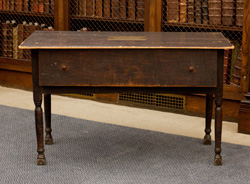 Williams Table Collection.
Williams Table Collection.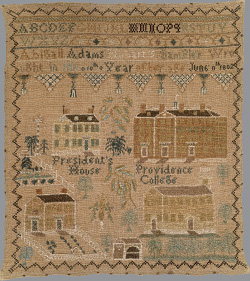 Abigail Adams Hobart, Sampler (Providence, 1802).
Abigail Adams Hobart, Sampler (Providence, 1802).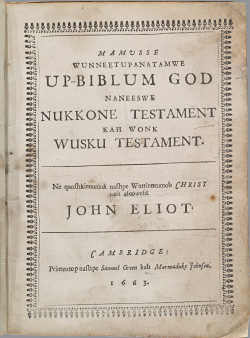 The Holy Bible…Translated into the Indian Language (Cambridge, [Mass.]: Samuel Green & Marmaduke Johnson, 1661, 1663).
The Holy Bible…Translated into the Indian Language (Cambridge, [Mass.]: Samuel Green & Marmaduke Johnson, 1661, 1663).The library grew slowly during the six years the College remained in Warren. William Williams, a member of the College’s first graduating class (1769), later remarked that the entire library was kept in the capacious drawer of his study table. Though the story may be apocryphal, the table is quite authentic. Today, William Williams’s table presides over the principal reading room of the John Hay Library.
In the spring of 1770, the College moved to Providence where it was located temporarily on the second floor of the Old Brick Schoolhouse, still standing toward the lower end of Meeting Street where it serves as the headquarters of the Providence Preservation Society. Within two years, the College was installed in the new “College Edifice” (now University Hall) on the crest of College Hill. The library of about 250 volumes occupied a chamber on the first floor of the College Edifice. Although President Manning described the library as “wholly inadequate,” it contained several important early books. Among the more significant were James Mitchell Varnum’s copy of Stephen Hales’s Statical Essays, the most important 18th century contribution to plant physiology other than the work of Harvey; the 1660 Oxford translation into Arabic of Grotius’s De Veritate Religionis Christianae; Erasmus’s Colloquia, presented by John Carter, the most important printer in colonial Providence; the 1638 edition of Galileo’s Discorsi e Dimostrazioni Matematiche, with copious annotations in the hand of Robert Payne, an early English translator of Galileo, donated by Jacob Mann, Class of 1774; and Roger Williams’s copy, with his marginalia, of the 1663 first edition of John Eliot’s Indian Bible. The Indian Bible is without question the rarest and most historically significant book in the colonial College Library.
The College Library was, according to Henry Bartlett Van Hoesen’s Brown University Library, 1767–1782 (Providence, 1938), “taken with other book resources available to the students…of adequate scope if not of adequate quantity” to educate young men of the colonial era. Van Hoesen’s study identified just over 30 donors of books among the faculty, Corporation, students, alumni and “other friends” from Rhode Island, Massachusetts, New York, Pennsylvania, and England. Predictably, almost half the collection was concerned with theology.
While politics, government, English, and Continental literature were only sparsely included, classical Greek and Latin authors were well represented in the College library as were such “modern” philosophical writers as Descartes, Hobbes, and Locke. Mathematics and the sciences also were included in the early library along with their auxiliary subjects, surveying, navigation, and gunnery. Conspicuously absent were current imprints produced in the colonies themselves. However, such books, tracts, and newspapers were not considered to be appropriate for the College’s course of study and, as Van Hoesen observed, faculty and students alike had access to the Providence Library Company whose catalog of 1780 included many titles lacking at Brown.
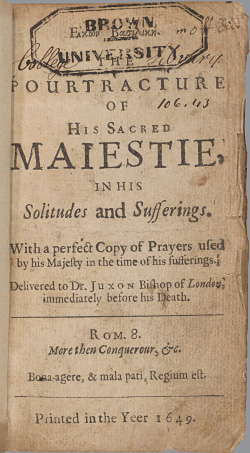 Eikon Basilike, the Pourtracture of His Sacred Maiestie [Charles I], in his Solitudes and Sufferings (London, 1649).
Eikon Basilike, the Pourtracture of His Sacred Maiestie [Charles I], in his Solitudes and Sufferings (London, 1649).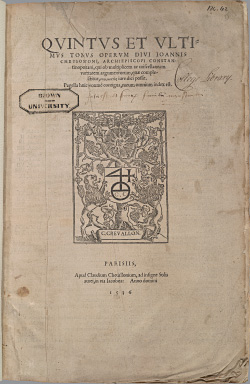 St. John Chrysostum, Operum Divi Ionnis Chrysostomi (Paris: Claude Chevallon, 1536).
St. John Chrysostum, Operum Divi Ionnis Chrysostomi (Paris: Claude Chevallon, 1536).Two of the more valuable collections to be given to the library during the colonial period were those of Thomas Eyres and Joseph Dolbeare Russell, both of Newport. Eyres, a physician and Yale graduate, was one of the College’s incorporators and served as Secretary of the Corporation from 1764 to 1776. The Eyres gift, described by Van Hoesen as presenting “a greater variety of interests than any other colonial gift to the Library,” included: Vitae Philosophorum, printed at the Plantin Press (Antwerp, 1596); Eikon Basilike, the Pourtracture of His Sacred Maiestie [Charles I], in his Solitudes and Sufferings (London, 1649); Roger Manley’s History of the Rebellions in England (London, 1691); Terence’s Comoediae Sex… Notae… Joh. Minellii (Cambridge, 1700) and Newton’s Principia Mathematica (Amsterdam, 1714).
Similarly broad in scope is the collection of over 80 books donated by Joseph Dolbeare Russell, Class of 1772. In May, 1771, Russell, then a 15-year-old student, gave his “Present to our College” so as “to testify the great Regard and Esteem which I have always had and hope I always shall have for it.” Russell appended a partial list of the gift: “Lord Kaims [sic] on Criticism. 2 volumes, Reid on the Mind, Watts Philosophical Essays, Grove’s Moral Philosophy, Jenning’s Algebra,… [The] Spectator, Paradise Lost and Regained, [and] Hurrion’s Sermons, History of Iceland….” Other books included in the Russell gift were St. John Chrysostom’s Operum (Paris, 1536); Severinus Slueter’s Anatomia Logicae Aristoteleae (Frankfurt, 1610); and La Rochefoucauld’s Réflexions (Paris, 1725).